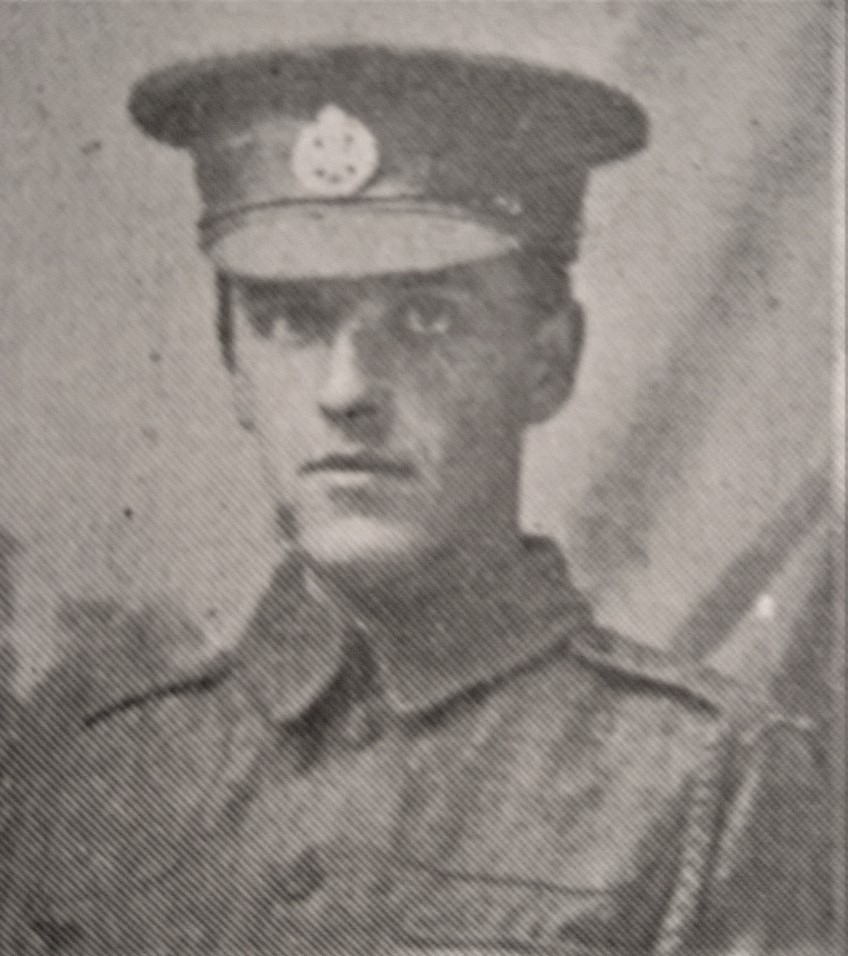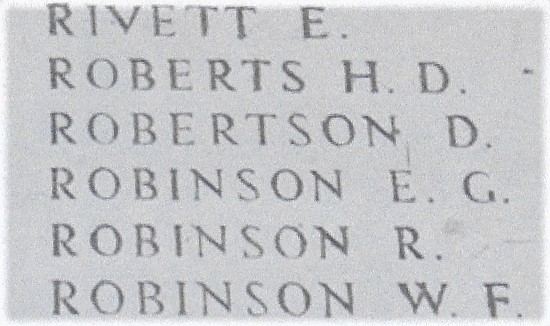3/7275 RIFLEMAN ERLE GEORGE ROBINSON
8TH (SERVICE) BATTALION RIFLE BRIGADE
KILLED IN ACTION
6TH JULY 1915
AGE 21 YEARS
Erle George Robinson was another young man who left Halesworth in the years leading up to the beginning of the Great War. Erle was born during the third quarter of 1894, the first of the three children of Edward, an agricultural labourer, and his wife Anna (née Button). In early 1898 the children’s father passed away at the young age of thirty-one, leaving Emma to bring up their three offspring by herself, with all of them under three years of age. Fortunately her situation did not last long as in the third quarter of 1899 she married Charles Alpe, a dairy farmer of Town Farm, who had his business premises in Bridge Street, Halesworth. The 1911 census lists Erle living with his mother and stepfather in their home at 16 Quay Street. He must have been a fine, well-mannered young man as, aged just sixteen years, his occupation is listed as being that of a footman, no doubt in one of several grand houses in the local area, possibly Blyford Hall. It would have been at some time after the census that he had travelled to London. No doubt he had found a better position or perhaps he had relocated with members of the local well-to-do family.
At the outbreak of World War One in August 1914, from information shown in his obituary notice published in the Halesworth Times of 20th July 1915, and later in the 1916 edition of Lamberts Almanack, we learn that Erle had enlisted to serve in the army during the first week of December 1914, but prior to that he had undergone a painful operation to enable him to serve and be fit for the rigours of military life. What this operation was for is unknown but, as with any type of medical procedure at that time, it could have been very expensive. It is therefore possible that his employer would have paid for his treatment. After recovering from his operation he presented himself at the recruiting office located at Charing Cross in central London, where, after being classified fit to serve in the Infantry, he signed on, becoming S/7275 a Rifleman in the Rifle Brigade. The ‘S’ prefix to his regimental number indicates that he had enlisted to serve in one of Lord Kitchener’s New Army Service Battalions, Erle joined the 8th Battalion where he remained for the rest of his service. His battalion had been formed at Winchester, Hampshire on 21st August 1914 before eventually moving to Aldershot, known for many years as the home of the British Army. Here he and his fellow recruits would undergo their basic training before they were considered fit for front line duty. Their time came when they crossed to France on 20th May 1915 as part of the 41st Brigade of the 14th (Light) Division.
Within a few weeks of their arrival on the Continent, the 8th Rifles were in the front line trenches to the east of the Belgian town of Ypres. It was here on 6th July 1915 that Erle would lose his life. The battalion’s war diary for that day relates that in the early morning the German artillery opened a bombardment that would go on to last for two hours. During the shelling a section of the British trench collapsed, burying several men. During the confusion that followed, a party of German grenadiers (bomb throwers) rushed forward and attacked the breach in the line through which they then managed to gain entry to the British positions. Within a short time an officer of the 8th Rifles organised a counter-attack along their trench which succeeded in ejecting the enemy and driving them back to their own line. During this action the Rifles suffered seventeen men wounded and three soldiers killed, one of those being poor Erle.
As recorded previously, Emma announced the loss of her son in the town’s newspaper. She related that she had received a letter of sympathy from her son’s Platoon Commander, Lieutenant Michael Scrimgeour, late of Blyford Hall, in which he wrote:
July 12th, 1915
Dear Mrs. Alpe,
“I must just write a line to tell you how sorry I am at the loss of your son. As his Platoon Officer, I can speak very highly of his courage and cheerfulness under all circumstances, and his death is a great loss to the Platoon no less than to you. He had done his duty, played his part in the great war, and died as a soldier should. He suffered no pain, and was buried quietly behind the firing line. I know you feel it a great deal, but comfort yourself with the knowledge that he died in the performance of his duty to King and country, than which there is no finer end.
Yours truly, Michael Scrimgeour, 2nd Lt. 8th Batt. Rifle Brigade.”
With his Officer’s connection to nearby Blyford Hall, it is possible that he may have taken Erle with him initially to London as his man servant and then to join him in the army to serve as his Batman. These associations were not uncommon during the early years of the 20th century. Sadly, within days of writing his letter to Emma, on 12th July 1915, Michael Scrimgeour fell in battle, himself being killed in action on 30th July 1915.
In his letter the Lieutenant mentioned that his friends had buried her son quietly behind the line. Sadly in the ebb and flow of the next three years of warfare Erle’s body was lost, as was Michael Scrimgeour. Both of them are today remembered on the Ypres (Menin Gate) Memorial to the missing (see below).
On 20th May 1919 Emma received the final of two payments of gratuity paid in respect of her son’s life, totalling £5.10s.7d (£5.53p). She would also have been entitled to claim his medal entitlement of the 1915 Star trio with his named bronze memorial plaque and scroll.
The location of these is unknown.
Losing Erle was not Emma’s only worry during the war, as his younger brother, Ralph Robinson, had served with the Suffolk Regiment in France. While her husband Charles Alpe and their son Donald both served, although they had did not travel overseas.


